Essential tips for resin driveway care:
Regular sweeping or leaf-blowing prevents dirt accumulation. Clean thoroughly with warm, soapy water and a soft-bristled brush, using circular movements. When pressure washing, keep the setting under 150 bar (similar to a typical garden hose pressure) and maintain a 20cm gap from the surface.
Check regularly for stains from oil, petrol or fallen leaves – tackle these straight away with appropriate cleaning solutions from your local DIY shop. Examine for small cracks, particularly after harsh weather, and address any damage promptly to prevent it spreading.
Apply a fresh seal coat every 2-3 years, much like treating a wooden fence, to maintain protection. Your driveway will need resealing more frequently if it faces heavy traffic or harsh weather conditions.
Key Takeaways
Five Essential Tips for Resin Driveway Care
Sweep or blow leaves and debris regularly – this prevents dirt build-up and keeps your driveway looking smart.
Clean with gentle soap and a stiff-bristled brush – avoid bleach or harsh chemicals, as they’ll damage the resin surface. Washing-up liquid works brilliantly.
Check monthly for any problems – look out for stains or small cracks, much like you’d check your car. Sort issues quickly to avoid costly repairs later.
Get your driveway resealed every 2-3 years – think of it as sunscreen for your resin surface, protecting it from Britain’s weather.
Tackle oil spills straight away – sprinkle baking soda or cat litter on fresh spills (just like you would on a kitchen grease spill). Leave it for an hour, then sweep away.
Essential Cleaning Techniques
Regular cleaning keeps resin driveways in top condition and extends their lifespan. Sweep with a stiff broom or leaf blower daily or weekly to remove leaves and loose debris.
For basic cleaning, a garden hose will shift everyday dirt, whilst stubborn areas need a gentle detergent or specialist resin cleaner mixed with water. Additionally, be sure to conduct regular inspections to determine the cleaning needs and frequency based on dirt exposure. Regular cleaning minimizes the need for more intensive deep cleaning later on.
For thorough cleaning, use a pressure washer at no more than 150 bar. Keep the nozzle 20cm from the surface, moving in steady sweeps to prevent damage. Always rinse well with clean water.
Deal with spills straight away to avoid staining. Use a degreaser and stiff brush on oil marks, and tackle organic matter like leaves or moss with mild detergent.
Stick to this simple maintenance routine, and your resin driveway will stay clean and smart for years.
Regular Maintenance Practices
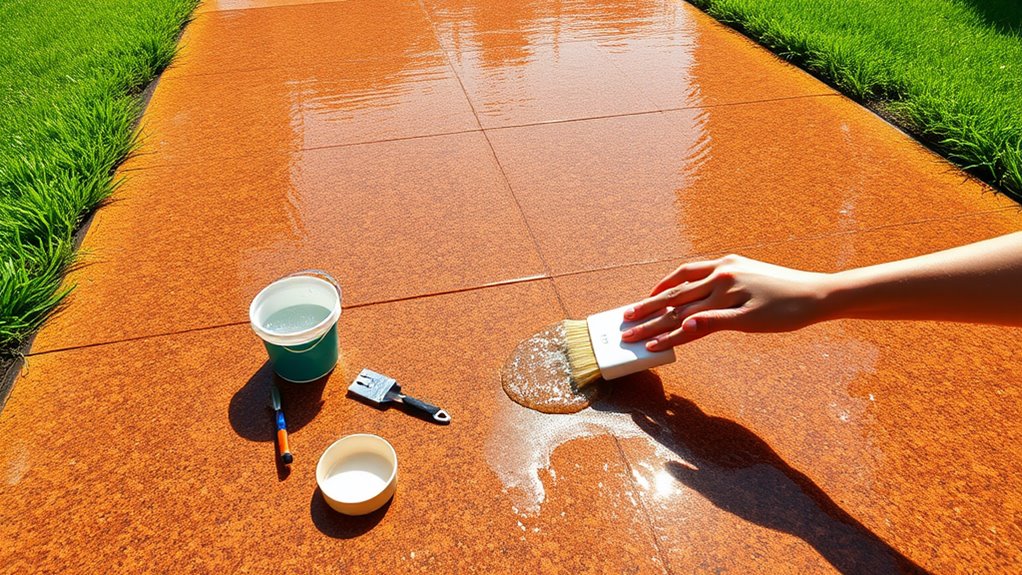
Regular sweeping or leaf-blowing keeps your resin driveway spotless and prevents debris build-up. Use gentle cleaning products like diluted washing-up liquid rather than harsh chemicals that might harm the surface. A quick monthly clean, particularly after autumn leaf fall or muddy winter spells, helps maintain your driveway’s appearance and durability for years to come. Additionally, regular cleaning maintains appearance and ensures the longevity of your resin driveway. Implementing regular inspections for stains and debris allows for proactive maintenance that preserves your driveway’s integrity.
Routine Sweeping and Blowing
Maintaining a Resin Driveway
Regular sweeping and blowing are vital for keeping your resin driveway in top condition. A weekly sweep with a stiff-bristled broom prevents dirt build-up and staining – much like keeping your front path clean. Work in a methodical sweeping motion to remove leaves and soil effectively. Additionally, routine cleaning helps preserve the driveway’s aesthetic appeal and prolong its lifespan.
During autumn months, combine your sweeping with a leaf blower for best results. Pay special attention to edges and corners where leaves and debris collect.
Maintenance Schedule:
| Task | Frequency | Tools Needed |
|---|---|---|
| Sweeping | Weekly minimum | Stiff-bristled broom |
| Blowing | As required | Leaf blower |
| Edge Care | Weekly | Stiff-bristled broom |
| Pressure Washing | When needed | Pressure washer (cold water) |
Mild Cleaning Solutions Usage
Mild cleaning solutions are essential for maintaining your resin driveway after sweeping and blowing. A gentle detergent works well to remove stubborn dirt and stains without damaging the surface. Avoid harsh chemicals and acids, as these will discolour your driveway.
Mix warm water with a mild detergent and scrub using a stiff or soft-bristled brush in circular motions. Always rinse thoroughly afterwards – any leftover detergent will attract more dirt. Test the solution on a small patch first to ensure it’s suitable for your resin surface.
Deal with stains as soon as they appear. For oil or drink spills, blot the liquid first, then clean. Some stains might need a second clean.
A regular clean every few weeks will keep your driveway looking fresh. Simple household detergents like washing-up liquid work perfectly well – there’s no need for specialist products.
Preventing Surface Damage
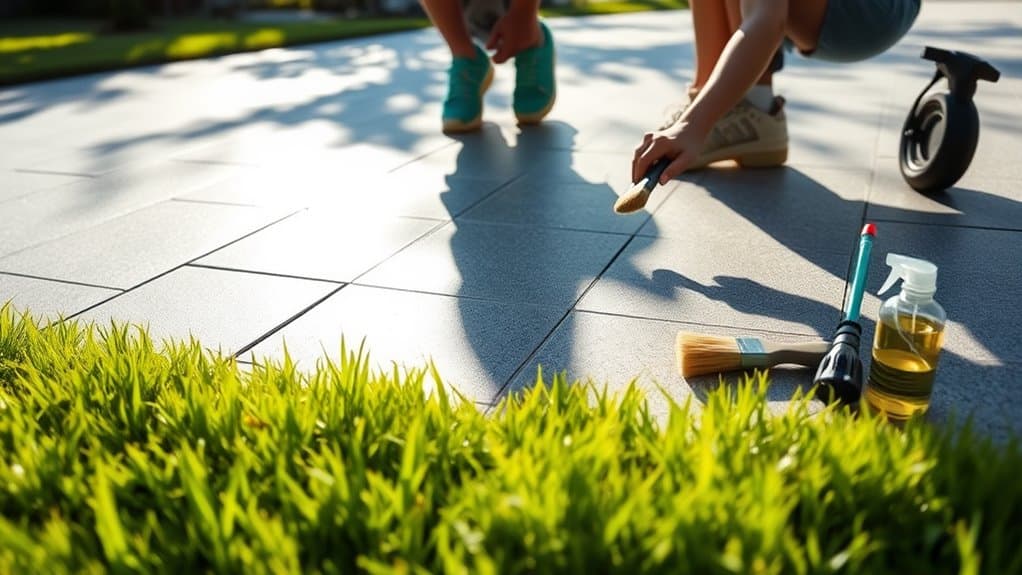
Keep your resin driveway intact by avoiding pressure washers, which can dislodge stones and harm the surface.
Don’t leave heavy vehicles, like caravans or lorries, parked in one spot, as they’ll create dips in the surface.
Check regularly for weeds and any early signs of wear – sorting small issues promptly prevents costly repairs later. Additionally, ensure to use UV-resistant materials during installation to minimize fading and discoloration from sun exposure.
Avoid High-Pressure Washing
High-pressure washing can seriously damage your resin driveway and should be avoided. The intense pressure can dislodge stones and break down the resin binding, leading to a loose, chipped surface. Any existing cracks will likely worsen, and new ones may form.
If you must use a pressure washer, follow these safety steps:
- Choose a washer with adjustable settings
- Use a wide-angle nozzle to spread the pressure
- Pre-soak the surface with water to loosen dirt
- Keep pressure between 1,000-2,500 psi
- Stick to low or medium settings
Check your driveway for any damage before washing. Regular brushing with a stiff broom will keep it looking smart and prevent dirt build-up.
Try the pressure washer on a small, hidden area first if you’re unsure. Much like caring for a car, gentle cleaning methods will protect your investment and maintain its appearance.
Prevent Heavy Vehicle Parking
Heavy vehicles pose a significant risk to resin driveways and must be kept off these surfaces whenever possible. The weight can create permanent dents and structural damage that’s costly to repair.
If you must accommodate a heavy vehicle:
- Place thick wooden boards across the surface to spread the weight
- Never park in the same spot repeatedly
- Move vehicles promptly to prevent prolonged pressure
For properties regularly needing heavy vehicle access, consider:
- Installing reinforced resin surfaces
- Creating dedicated parking zones with suitable materials
- Consulting specialists about weight-bearing alternatives
Check your driveway regularly for early warning signs like small indentations or cracks.
Proper installation is crucial when heavy vehicle use is expected, so work with qualified contractors who understand these requirements.
Remember that prevention is far cheaper than repairs. Setting and enforcing clear parking rules will help maintain your resin driveway’s appearance and structural integrity for years.
Regular Weeding and Inspection
Regular weeding and checks are vital for maintaining your resin driveway. A proactive approach prevents weed growth and keeps your driveway looking smart whilst protecting its structure. Spotting weeds early means tackling problems before they worsen.
Essential maintenance steps:
- Sweep with a soft brush to clear weeds and debris, making growth spots easier to identify
- Use suitable weed killers that won’t damage the resin surface
- Check the entire surface yearly for cracks, colour changes or water damage
Think of it like caring for your garden path – regular upkeep saves bigger headaches later.
Most UK homeowners find a quick weekly sweep and monthly inspection works well to keep their resin driveways in top condition.
Repairing and Resealing
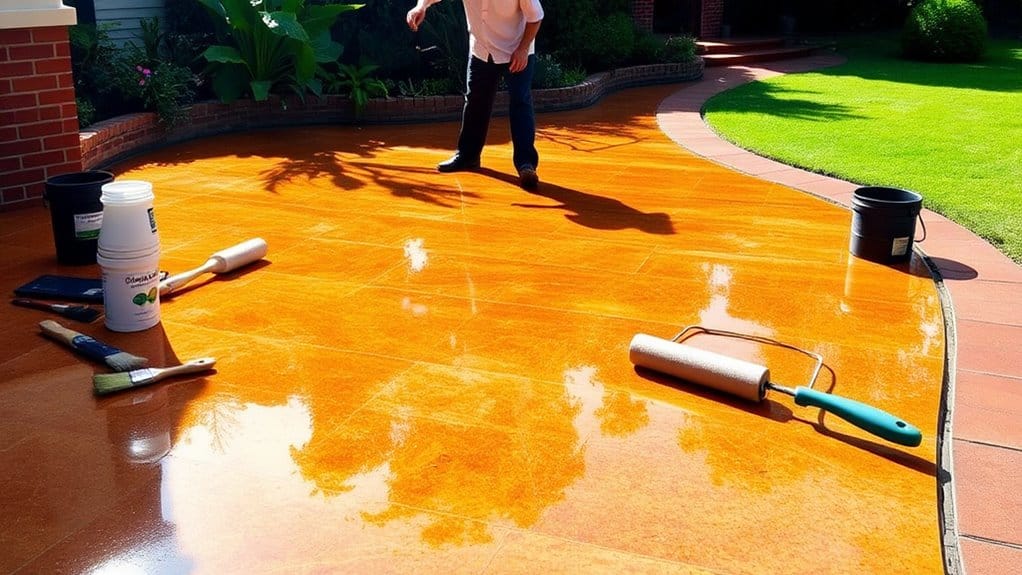
Repairing and resealing your resin driveway is vital for maintaining its look and lifespan. For minor damage, start with a patch repair. Clean the damaged area thoroughly with a stiff brush and mild detergent.
Mix the patch repair resin as per the manufacturer’s guidance, then apply with a putty knife to fill any cracks or holes. Ensure the patched area sits level with the rest of the driveway and let it cure fully before use.
For surface sealing, first clean the entire driveway to remove dirt, debris and old sealant residue. Apply a quality sealer evenly using a roller or brush, ensuring total coverage.
Resealing brightens the driveway’s appearance whilst protecting against damage and colour fading. It’s worth resealing every few years to keep your driveway in top condition. Regular inspections help identify early signs of damage before they escalate into more significant issues.
If you’re not confident about tackling the job or face extensive damage, call in a professional. Their expertise will ensure proper repairs and resealing, helping your driveway stay looking fresh for years.
Effective Stain Removal
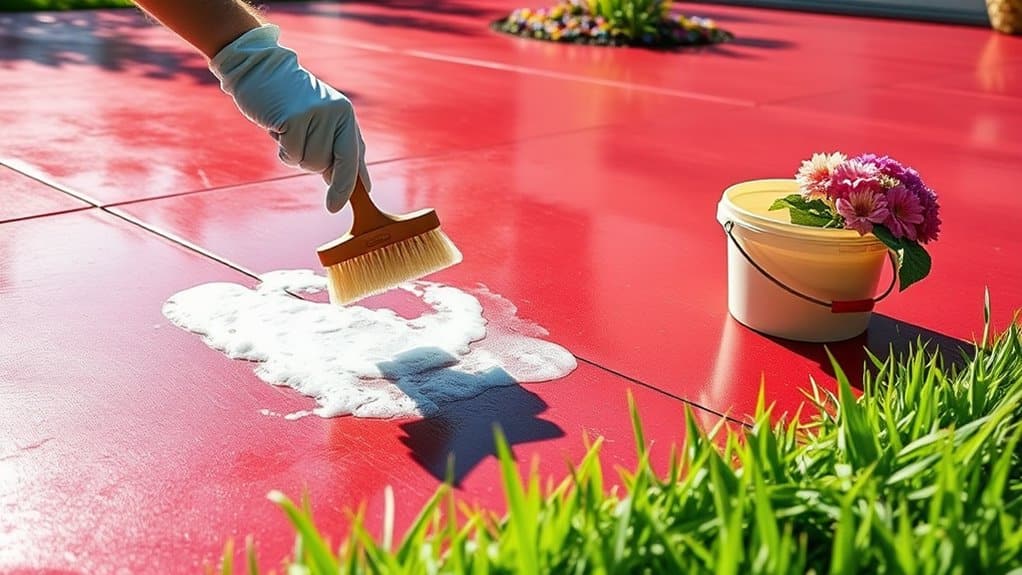
Keeping Your Resin Driveway Clean
Proper stain removal is vital for maintaining your resin driveway’s appearance. Regular checks and prompt cleaning prevent long-term damage and keep costs down.
Common Stain Solutions:
- Baking Soda Method: Simply sprinkle baking soda on oil patches and leave for 15-20 minutes. For tyre marks, mix with water to form a paste, scrub lightly, then rinse.
- Oil and Grease Spots: Cover fresh spills with cat litter or baking soda. Wait 15-20 minutes, sweep up, then wash remaining marks with washing-up liquid and warm water.
- General Cleaning: Mix washing-up liquid or specialist resin cleaner with water for routine cleaning. Tackle moss and algae with dedicated anti-growth products. Regular sweeping with a sturdy broom(#) can significantly enhance your cleaning efforts.
Check your driveway weekly, particularly where cars park regularly.
Catching spills early makes removal much easier and maintains your driveway’s smart appearance.
General Maintenance Tips
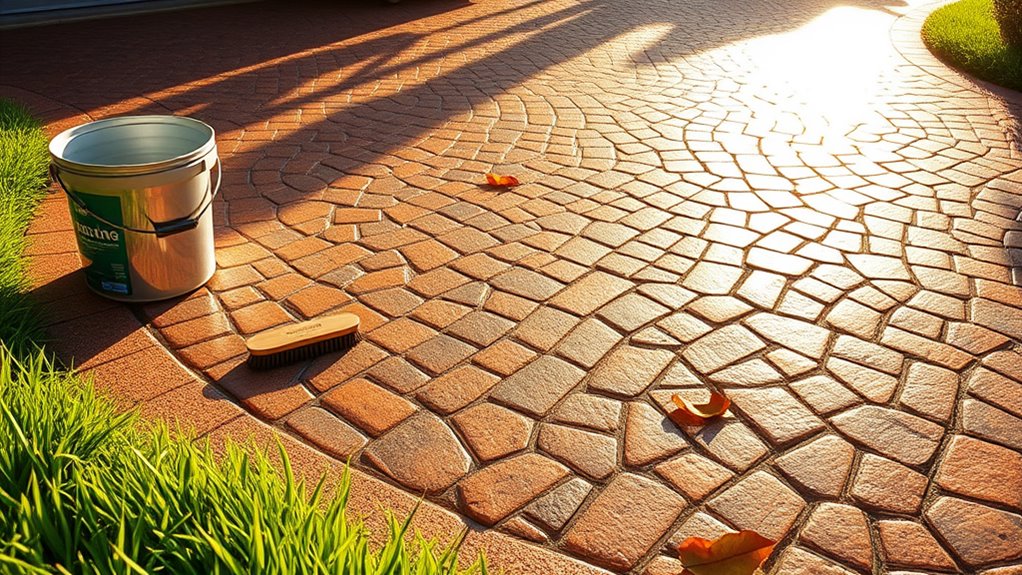
Regular Maintenance Tips for Resin Driveways
Keep your resin driveway in top condition with these straightforward maintenance steps:
Sweep regularly with a stiff brush or leaf blower to clear debris. During autumn, step up the sweeping to manage fallen leaves.
For thorough cleaning:
- Use a pressure washer on low/medium setting
- Keep nozzle 20cm from surface
- Test on a small patch first
- Use mild soap rather than harsh chemicals
- Rinse well to remove soap residue
Essential care:
- Avoid parking lorries or heavy machinery
- Ensure proper drainage to prevent water pooling
- In winter, use a plastic shovel for snow removal
- Don’t use salt-based de-icers
- Time deep cleans for spring or summer
These simple habits will protect your investment and maintain your driveway’s appearance year-round.
Long-Term Care Strategies
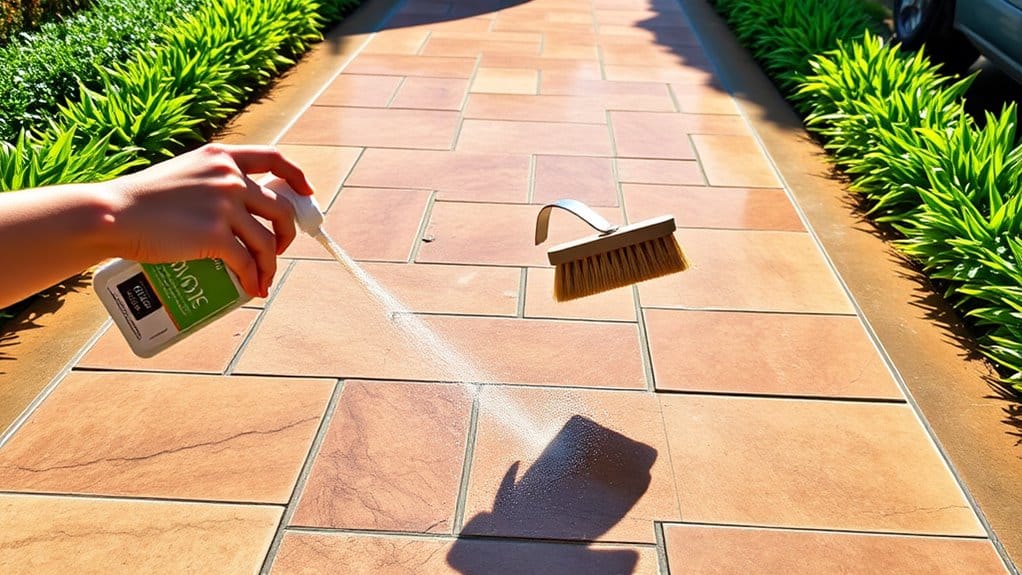
Long-Term Care Strategies
Proper care ensures your resin driveway remains durable and attractive for years. Regular maintenance and protection are vital for long-term performance.
Key strategies:
- Regular Sweeping: Remove leaves, dirt and debris weekly to prevent surface damage.
- Prompt Stain Treatment: Clean oil, fuel and wine spills immediately with appropriate cleaners.
- UV Protection: Apply a quality UV sealant every 2-3 years to prevent sun damage.
Check your driveway monthly for cracks, discolouration or wear. Sort problems quickly to avoid costly repairs later.
A well-maintained resin driveway typically lasts 15-20 years, making it a sound investment for your property.
Practical tip: Keep a suitable cleaning kit handy – a soft brush, mild detergent and pressure washer will tackle most maintenance tasks effectively.
Frequently Asked Questions
Can I Install a Resin Driveway Myself?
Whilst you can install a resin driveway yourself, it’s a complex task that requires proper planning and expertise. You’ll need specialist tools, thorough ground preparation and precise mixing ratios for the resin compound. DIY installation is best suited for those with solid construction experience and smaller driveways – for larger areas, consider hiring professionals to ensure lasting results.
How Long Does a Resin Driveway Typically Last?
A properly installed resin driveway typically lasts 15 to 25 years. Regular maintenance, including sweeping and pressure washing, helps protect your investment and maintain its appearance throughout the British seasons. Much like caring for a traditional concrete drive, simple upkeep ensures the resin surface stays in top condition.
Will Resin Driveways Crack in Extreme Temperatures?
Resin driveways can indeed crack in extreme temperatures. British weather, with its notorious freeze-thaw cycles in winter and occasional summer heatwaves, puts these surfaces to the test. The material expands in the heat and contracts in the cold – rather like a plastic bottle left outside year-round. To prevent cracking, proper installation is crucial: the base must be sound, drainage well-planned, and only high-grade resin used. A professionally installed resin driveway from a reputable UK contractor will better withstand our climate’s mood swings.
Can I Drive Heavy Vehicles on a Resin Driveway?
A properly installed resin driveway can safely support heavy vehicles, much like a well-built car park surface. The key lies in the base construction – a robust sub-base of at least 150mm MOT Type 1 aggregate, properly compacted and sealed, provides essential support for larger vehicles. Whilst domestic resin driveways easily handle standard cars and vans, lorries and heavy machinery require additional reinforcement during installation. It’s worth consulting your installer about expected vehicle weights to ensure suitable specifications.
Are Resin Driveways Eco-Friendly?
Resin driveways tick several green boxes for environmentally-conscious homeowners. They incorporate recycled materials like glass and plastic that would otherwise end up in landfills, whilst their porous nature allows rainwater to drain naturally into the ground rather than overwhelming storm drains. Unlike traditional concrete or tarmac drives, resin surfaces help reduce localised flooding – particularly handy given the UK’s rainy climate. That said, some resin products use petroleum-based materials, so it’s worth checking with suppliers about their specific environmental credentials.
Conclusion
Following these maintenance tips will help preserve your resin driveway’s appearance and durability. Regular cleaning and prompt repairs prevent deterioration and maintain the surface’s pristine condition. A bit of routine care helps avoid costly damage and keeps stubborn stains at bay. Make maintenance a priority to protect your investment and keep your driveway looking smart for years to come.
